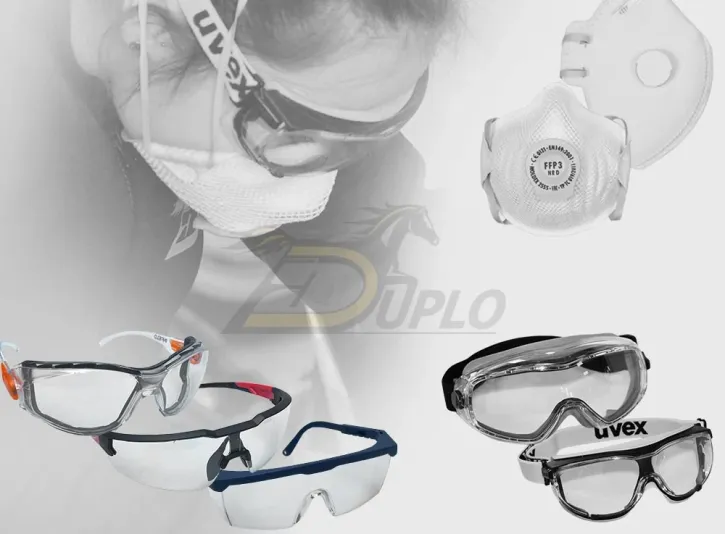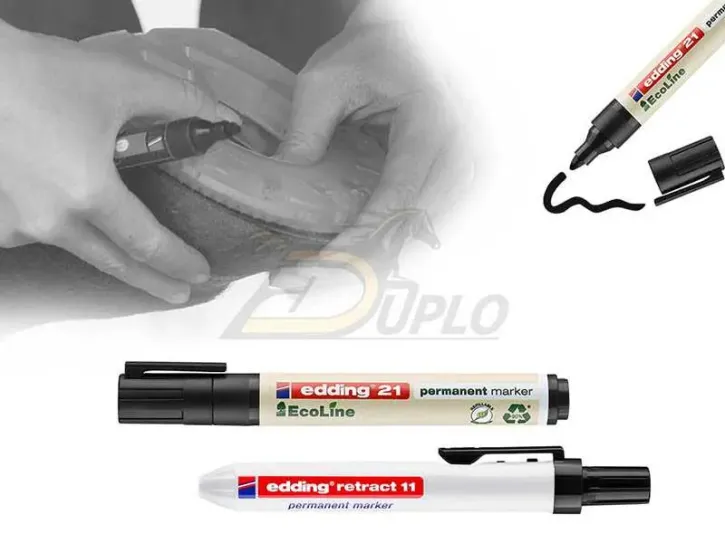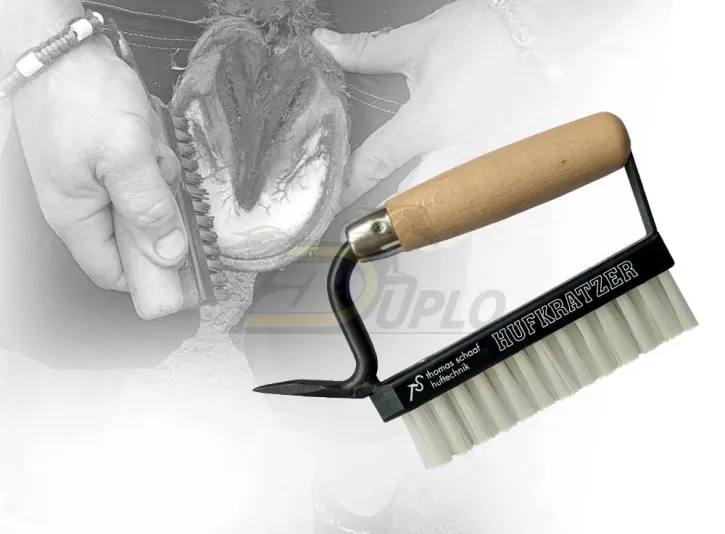Work Gloves and Disposable Gloves - Protect your Hands for All Tasks Related to Horses and Hooves
The most important tool for the farrier is their hands - that's why it's important to protect them. In many tasks, certain safety regulations and the corresponding protective equipment, such as gloves, are already prescribed by the employers' liability insurance association in Germany.
But even as a rider, there are many situations in the stable where gloves are useful. This includes, of course, the farrier appointment first and foremost, but also when lunging, riding with a lead horse, or simply when picking out hooves or applying various hoof care products, the right gloves are essential.
When choosing the right glove, consider the following aspects:
-
Material Used
High-quality gloves are made of durable and long-lasting materials such as leather, synthetic fabrics, or special fabrics that meet the requirements of the respective work. -
Fit
The fit is crucial for the comfort and functionality of the gloves. The glove should neither be too tight nor too loose to allow optimal freedom of movement and dexterity. -
Reinforcements
Work gloves or protective gloves may have reinforcements at stress points such as fingertips, palms, or backs of the hands to provide additional protection and durability. -
Protective Features
High-quality gloves should provide specific protective features that meet the requirements of the respective activity. This may include cut protection, shock absorption, heat resistance, or chemical protection. In the field of hoof care, cut protection is particularly important, so we offer Wonder Grip® Dexcut™ cut-resistant gloves. The WG-787 for normal temperatures and the WG-780 with additional cold protection for the winter months. -
Breathability
Gloves should have good breathability to ensure a comfortable feel and reduce hand sweating. Breathability also depends heavily on the material used. -
Abrasion Resistance
Gloves should be abrasion-resistant to prevent wear and tear, especially when working with rough surfaces or sharp edges. -
Certifications
Gloves that comply with certain safety or standardization standards, such as EN standards or specific industry standards, can be an indicator of their quality. In the product details below, we provide more information about the gloves we offer.
Gloves in the Everyday Life of Farriers and Riders — Fotos

Especially during hoof trimming, the additional cut protection of the Wonder Grip® Dexcut™ WG-787 can be helpful.

To modify our horseshoes, the SuperFlex work gloves from Allcolor can be a good choice.

We like to use both the SuperFlex and the Wondergrip® Dexcut™ WG-787 for fitting our horseshoes to the shape of the horses hooves.

When wrapping the cast shoe with the cast bandage, we always recommend wearing disposable gloves.

Disposable gloves should be worn for applying various hoof care products.

For working with the rapid adhesive, we prefer to use STRONGHAND® disposable gloves.

When lunging the horse, the cut-resistant gloves from Wonder Grip® are a good choice.

When riding with a lead horse, the Wonder Grip® Dexcut® WG-787 provides good protection if the lead rope becomes tense.

For the application of various hoof care products, it is recommended to wear disposable gloves.
Basic Knowledge and Product Features of the Different Gloves in Our Range
Let's take a quick look at the various work and disposable gloves that you can buy from us. In our opinion, gloves, just like the hoof pick, are essential equipment – not only for the farrier but also for the rider or horse owner.
As a manufacturer of horseshoes, we are naturally not specialists in work gloves. However, many riders and farriers are part of our team, so we have examined gloves from the user's perspective and compiled what we believe are the most important information.
What Glove Size is Right?
Just like any kind of hoof protection, every hand protection is only effective when the glove fits properly and stays in place!
When determining the right glove size, hand circumference is crucial. Finger length also plays a role; for longer fingers, opting for a larger size is often best, while the opposite may be true for shorter fingers. Particularly with work gloves, it's essential for them to fit securely and comfortably, allowing for easy donning and doffing.
While there are some tables online providing general guidelines for glove sizing, it's important to note that gloves are not standardized in terms of sizing. The precise size and fit depend on the manufacturer and the specific design of the model.
Additionally, it's important to differentiate between men's and women's gloves. A hand circumference of 19cm is often considered size 7. For women, this corresponds to size M, while for men, it corresponds to size S.

EN 388:2016 Classification on Work Gloves
Since EN 388:2016, there are two methods for assessing cut resistance to ensure the accuracy of the results.
The "Coup Test" is only conducted for materials that do not affect the sharpness of the blade during the test. For hand protection made from abrasive fibers such as High-Performance Polyethylene (HPPE) or glass and steel fibers - as used for Wonder Grip® Dexcut® cut-resistant gloves - this test is not performed and is therefore indicated with an X.

Understanding the Gauge Number in Work Safety Gloves
The term "15 Gauge" refers to the knit fineness of the work safety glove. It indicates how many stitches per inch are present in the glove's knit. The higher the gauge number, the finer the knit, and the more dexterity the glove provides.
In general, gloves with a higher gauge number have a finer structure, thereby offering better dexterity and sensitivity. They are particularly suitable for tasks requiring precision and tactile sense. Thus, the gauge number is also relevant for farriers, especially when it comes to holding a horseshoe nail, where precision and tactile sensitivity are important.
In contrast, work safety gloves with a lower gauge number have a thicker knit, providing stronger protection. These gloves are more robust and offer greater protection against mechanical hazards. They are well-suited for tasks requiring increased durability and protection.
Our Top Pick: Wonder Grip® Dexcut® WG-787 Cut-Resistant Gloves
From the perspective of the farrier, we consider these work gloves to be a good choice:
- During barefoot trimming.
- For all tasks involving the use of a hot-air gun.
- When fitting and modifying our horseshoes to fit each hoof individually.
But also from the rider or horse owner's perspective, the Wonder Grip® cut-resistant glove is an excellent choice. In our team, we have many female riders who prefer this glove.
- They use it during lunging to provide some protection to their hand if the horse tries to pull away.
- They wear it during the transitional period while riding, as it provides a good grip on the reins.
- They wear it when picking up hooves during the farrier appointment, as some additional protection for the rider's hands can be beneficial.
In conclusion, the Wonder Grip® Dexcut® WG-787 cut-resistant gloves are our top pick. While they may be slightly more expensive, we believe that the investment is worthwhile for both the farrier and the rider alike!

Product Features - Wonder Grip® Dexcut™ WG-787 Cut-Resistant Gloves
We have gathered and compiled the following information about this work safety glove for you.
| Marke | Wonder Grip® |
|---|---|
| Modell | Dexcut™ WG-787 |
| Material | Spandex, Mineral fiber, HPPE, UHMWPE : Tsunooga® |
| Palm Coated | Nitrile |
| Gauge | 13 |
| Color | green |
| Norms | EN 388:2016 (4.X.4.2.D) EN 420:2003 EN 407:2004 (X.1.X.X.X.X) PPE protection class: Category II |
| ANSI Cut Level | ANSI A4 CUT |
| Further Characteristics | Oeko-Tex Standard 100, food approval, CE |
| Sales unit | one pair |
For warm Hands: Wonder Grip® Dexcut® WG-780
Cut-Resistant Gloves with Cold Protection
The WG-780 combines cut resistance and cold protection, making it a great alternative to the proven WG-787 during the cold season. While the WG-780 is rated one level lower than the WG-787 in terms of cut protection, its liner offers superior protection against the cold.
Key Features of WonderGrip®:
- Durable, thick yet soft liner: Provides dexterity, protection from the cold, and Class A3/D cut protection.
- Ergonomic design: Fits the natural shape of the hand, allowing for freedom of movement and lasting comfort.
- Exceptional flexibility in sub-zero temperatures: The specially developed nitrile coating from WonderGrip, based on Sub-Zero Nitrile Technology (SZNT™), ensures flexibility and grip even in extreme cold conditions down to -20°C.
- Superior grip: WonderGripTechnology™ delivers reliable performance in dry to oily work environments, ensuring safe handling.
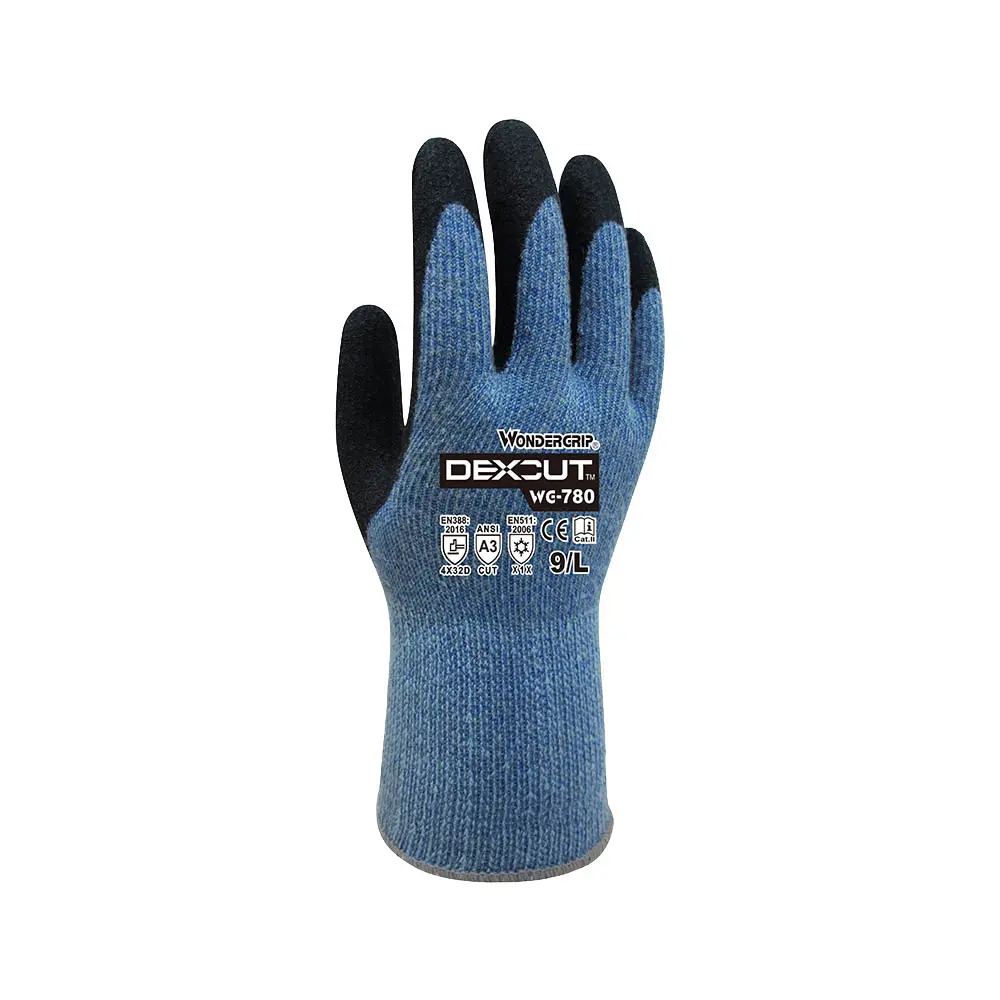
Wonder Grip® Dexcut® WG-78 Cut-Resistant / Cold-Protection Glove
Below is the information we’ve compiled about this protective work glove:
| Brand | Wonder Grip® |
|---|---|
| Modell | Dexcut® WG-780 |
| Material | Acrylic, Aramid, Spandex, Mineral Fiber |
| Palm Coated | Nitrile |
| Gauge | 10 |
| Color | blue |
| Norms | EN 388:2016 (4.X.3.2.D) – Cut Resistance: Level D EN 511:2006 (X.1.X) PPE Category II |
| ANSI Cut Level | ANSI A3 CUT |
| Further Characteristics | Oeko-Tex Standard 100, CE |
| Sales unit | one pair |
allcolor SuperFlex Work Gloves
The SuperFlex by allcolor is not strictly a cut-resistant glove, much like the Lintao by STRONGHAND®, but we find it quite comfortable to wear and a practical companion for many tasks in the stable and farrier's everyday life, provided they do not require exceptional cut protection.
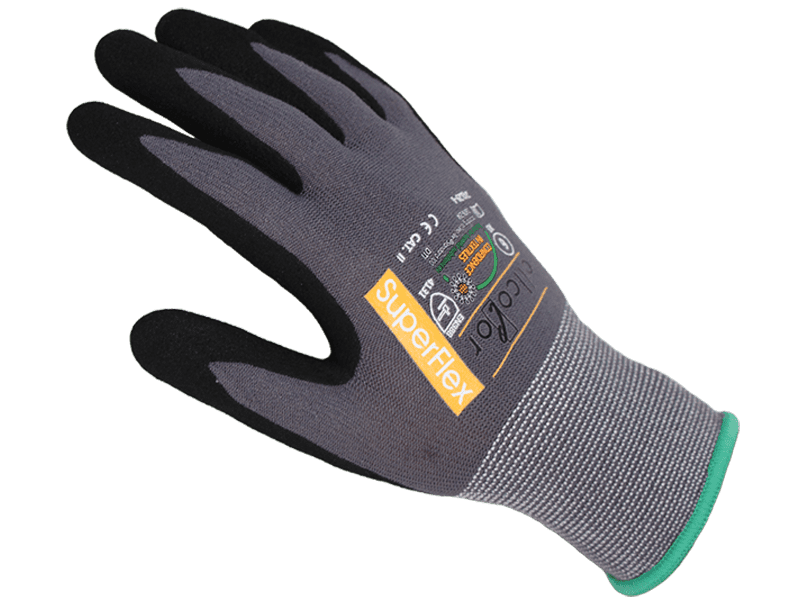
Product Features - SuperFlex Protective Work Gloves by allcolor
We have gathered and compiled the following information about this work safety glove for you.
| Brand | allcolor |
|---|---|
| Modell | SuperFlex |
| Material | Nylon/Elastane, silicone-free |
| Palm Coated | Nitrile |
| Color | black |
| Norms | EN388:2016 - 4131 PPE protection class: Category II |
| Further Characteristics | Oeko-Tex Standard 100, CE |
| Sales unit | one pair |
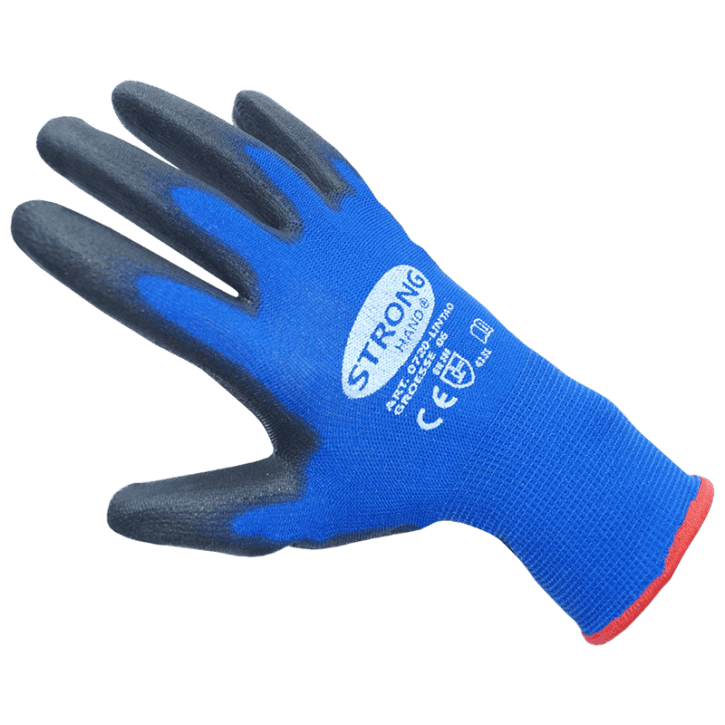
STRONGHAND® Lintao
These finely knit gloves with PU coating are not crafted from abrasive fibers, thus they don't offer the same level of cut resistance as specialized gloves, therefore, this glove underwent the Coupe Test. We believe its suitability for the daily tasks of farriers may be somewhat limited compared to the SuperFlex and the WG-787 Dexcut®
However, we still want to offer an alternative to those who need a particularly affordable hand protection for smaller, non-hazardous tasks, such as mucking out the stable. In our company f.ex. the STRONGHAND® Lintao is worn by our production team.
Product Features - STRONGHAND® Lintao
We have gathered and compiled the following information about this work safety glove for you.
| Marke | STRONGHAND® |
|---|---|
| Modell | Lintao |
| Material | 100% Polyamid (Nylon) |
| Palm Coated | Polyurethane |
| Gauge | 15 |
| Color | blue |
| Norms | EN 388:2016 (4.1.3.1.X) EN 420:2003 PPE protection class: Category II |
| Further Characteristics | CE |
| Sales unit | one pair |
STRONGHAND® Disposable Gloves
They are also part of the basic equipment in the stable - disposable gloves. Thrush, mud fever, or general wound care, the applications are diverse. As a farrier, disposable gloves are especially needed when it comes to glue-on horseshoes - of course, this can also be done with assembly or cut-resistant gloves; however, this ensures that the more robust gloves do not get glue on them. In the end, as is often the case in life, it's a matter of personal preference which type of hand protection you prefer to work with.
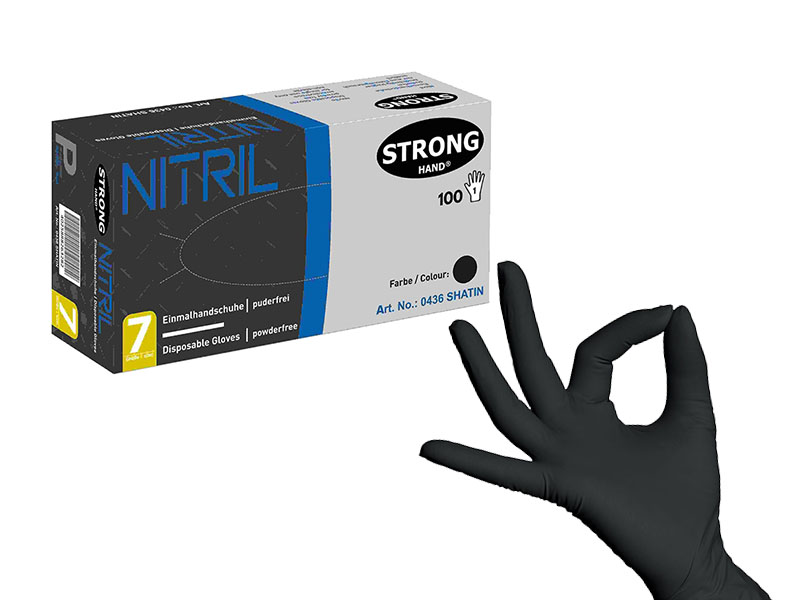

Use disposable gloves as hand protection for the following tasks with our products:
- to glue-on a horseshoe on the horses hooves
- to wrap a cast-bandage around the hoof to fixate a cast-shoe
- to apply the THM hoof-care products
Product Features - Disposable Nitrile Gloves
We have found the following information about disposable gloves and compiled it for you.
| Brand | STRONGHAND® | |
|---|---|---|
| Modell | STRONGHAND® 0436 Shatin - disposable nitrile gloves | STRONGHAND® 0422 GRIP - disposable nitrile gloves |
| Sales unit | one pack of 100 disposable nitrile gloves | one pack of 50 disposable nitrile gloves |
| Material | Nitrile | Nitrile |
| Color | black | black |
| further product features among others | ambidextrous, latex-free, powderfree, certified for food contact, non-sterile, CE | ambidextrous, latex-free, powderfree, non-sterile, CE, excellent grip + hold (dry + wet) thanks to waffle pattern |
| PPE protection class: | Category I | Category III |
The fundamental question from the farrier's perspective - Gloves yes or no?
Before determining whether work safety gloves can be worn for a specific task, it is important to clarify whether the gloves provide protection against the specific hazards without themselves posing a greater risk.
Especially in tasks involving rotating parts, where the risk of entanglement exists, the potential danger is often higher than the intended protection of the farrier's hand.
The risk of glove entanglement typically occurs during tasks involving the use of drills (including hammer drills), band saws, circular saws, and other handheld machines with rotating parts. With these devices, there's a risk of gloves being caught by the rotating surfaces, leading to injuries.
On the other hand, with angle grinders, large cut-off grinders, and jigsaws, there is generally less risk of entanglement, as the hands and thus the hand protection are usually not in close proximity to the rotating tools. However, there are exceptions even in these cases.
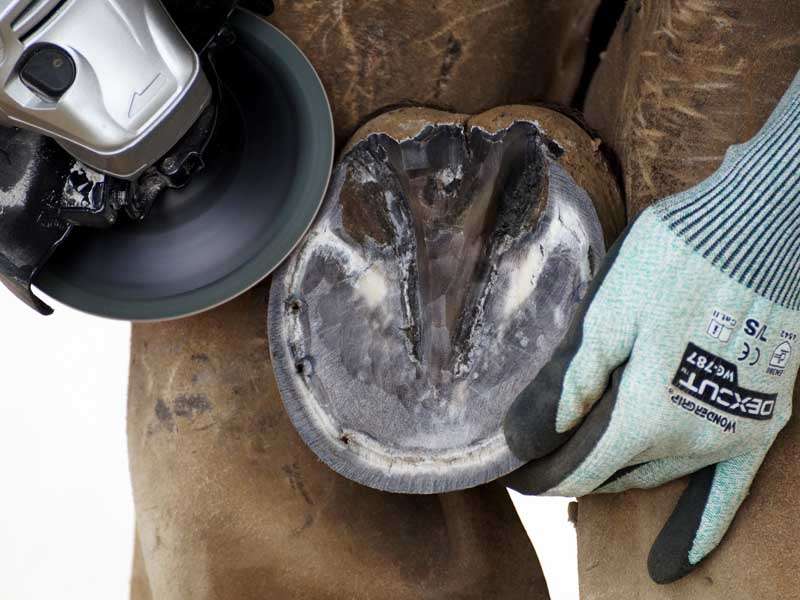

It's important to consider the specific requirements and recommendations for each task in the daily life of the farrier or hoof care professional to make the right decision regarding wearing hand protection. The risk assessment should aim to ensure one's own safety and, if applicable, that of the horse owner, while also ensuring that the hand protection does not pose an additional risk.
For example, when nailing-on a horseshoe, hand protection is often cumbersome. Even if you have a very good grip, such as with Wonder Grip®, many farriers prefer to remove their gloves to nail-on the horseshoe.
The risk assessment and the final decision to wear hand protection or not, and the associated risks, are the responsibility of the farrier or horse owner. Please also consider the safety instructions provided by the manufacturers of the work safety gloves and disposable gloves. When working with our products, always refer to our safety instructions, which are not only intended for the farrier during shoeing, but also for the rider and horse owner during the shoeing period.
Manufacturer in accordance with the Regulation (EU) 2023/988 on General Product Safety (GPSR)
Manufacturer in accordance with the Regulation (EU) 2023/988 on General Product Safety (GPSR)
Name: HELMUT FELDTMANN GmbHElectronic Address: info@feldtmann.de
Physical Address: Zunftstraße 28
ZIP Code: 21244
City: Buchholz in der Nordheide
Country: Deutschland
Responsible Person in accordance with the Regulation (EU) 2023/988 on General Product Safety (GPSR)
Name: HELMUT FELDTMANN GmbHElectronic Address: info@feldtmann.de
Physical Address: Zunftstraße 28
ZIP Code: 21244
City: Buchholz in der Nordheide
Country: Deutschland



